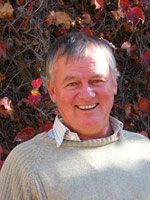
Entomologist
Phone: +27 21 6505556
Email: John.Hoffmann@uct.ac.za
Room No.: 2.37 John Day
Research profile
John Hoffmann is retired but continues part time work on the use of herbivorous insects for biological control of invasive alien plants (IAPs). His particular interest is in determining how effective introduced insects are in reducing the density, abundance and rate of spread of IAPs.
He collaborates closely with other entomologists at UCT and at the Plant Protection Research Institute of the Agricultural Research Council, an organisation that carries most of the responsibility for finding new biocontrol agents, screening them to ensure they are safe and effective and releasing them on the target pest in South Africa. He is an associate of the Centre for Biological Control at Rhodes University.
His recent projects have focussed on invasive Australian Acacia species, but insects on other invasive plant species, including cacti, pine trees, mesquite (prosopis), hakeas and sesbania, have also been investigated. The work has shown that several of the introduced biological control agents have had a major impact on some invasive plants, which have become relatively scarce and unimportant as a result (e.g. cacti and Sesbania punicea), but often the effects of the insects are less obvious and require meticulous, long-term surveys to detect. The results of these investigations are showing that even quite subtle changes brought about by the biocontrol agents can translate into very real long-term benefits in terms of protecting natural habitats from the devastating effects of IAPs.
Hoffmann, John H; Moran, V Cliff; Hill, Martin P. 2019. Conceptualizing, categorizing and recording the outcomes of biological control of invasive plant species, at a population level. Biological Control (in press).
Impson, Fiona AC; Hoffmann, John H. 2019. The efficacy of three seed-destroying Melanterius weevil species (Curculionidae) as biological control agents of invasive Australian Acacia trees (Fabaceae) in South Africa. Biological Control, 132: 1-7.
Rule, Nicola Frances; Hoffmann, John. 2018. The performance of Dactylopius opuntiae as a biological control agent on two invasive Opuntia cactus species in South Africa. Biological Control, 119: 7-11.
Marchante, H; LópezâNúñez, FA; Freitas, H; Hoffmann, JH; Impson, F; Marchante, E. 2017. First report of the establishment of the biocontrol agent Trichilogaster acaciaelongifoliae for control of invasive Acacia longifolia in Portugal. EPPO Bulletin.47: 274-278.
De Souza, NR; Hoffmann, JH. 2015. Testing the hypothesis that a cochineal insect species (Hemiptera: Dactylopiidae) may have been displaced by a congeneric biological control agent from a different cactus host. Biological Control, 85: 25-29.
Mokotjomela, Thabiso M; Hoffmann, John H; Downs, Colleen T. 2015. The potential for birds to disperse the seeds of Acacia cyclops, an invasive alien plant in South Africa. Ibis 157: 449-458.
Klein, Hildegard; Hoffmann, John H; Neser, Stefanus; Dittrich-Schröder, G. 2015. Evidence that Quadrastichodella nova (Hymenoptera: Eulophidae) is the only gall inducer among four hymenopteran species associated with seed capsules of Eucalyptus camaldulensis (Myrtaceae) in South Africa. African Entomology, 23: 207-224.
Moran, VC; Hoffmann, JH. 2015. The fourteen international symposia on biological control of weeds, 1969–2014: delegates, demographics and inferences from the debate on non-target effects. Biological Control, 87: 23-31.
Marchante, Hélia; Marchante, Elizabete; Freitas, Helena; Hoffmann, John H. 2015. Temporal changes in the impacts on plant communities of an invasive alien tree, Acacia longifolia. Plant Ecology, 216: 1481-1498.
Van Wilgen, BW; Moran, VC; Hoffmann, JH. 2013. Some perspectives on the risks and benefits of biological control of invasive alien plants in the management of natural ecosystems. Environmental Management, 52: 531-540.
Moran, V Cliff; Hoffmann, John H; Zimmermann, Helmuth G. 2013. 100 years of biological control of invasive alien plants in South Africa: History, practice and achievements. South African Journal of Science, 109: 1-6.
Kleinjan, CA; Hoffmann, JH. 2013. Advances in clarifying the phylogenetic relationships of acacias: relevance for biological control. Acta Oecologica, 48: 21-29.
Mokotjomela, TM; Hoffmann, JH. 2013. Removal of post-dispersed seeds in Acacia cyclops thickets under biological control in South Africa. South African Journal of Botany, 88: 260-264.
Moran, VC; Hoffmann, JH. 2012. Conservation of the fynbos biome in the Cape Floral Region: the role of biological control in the management of invasive alien trees. BioControl, 57: 139-149.
Haiden, SA; Hoffmann, JH; Cramer, MD. 2012. Benefits of photosynthesis for insects in galls. Oecologia, 170: 987-997.
